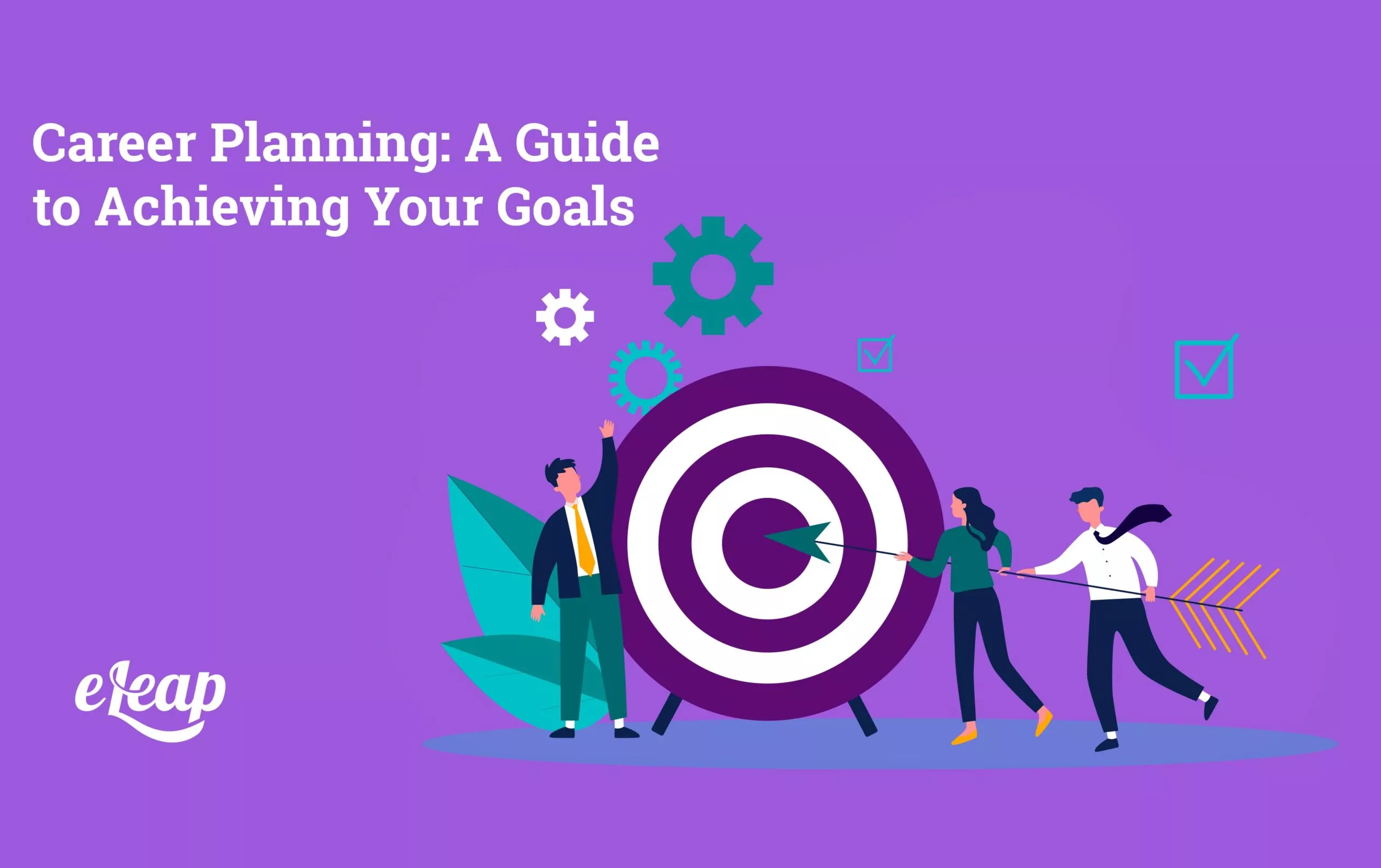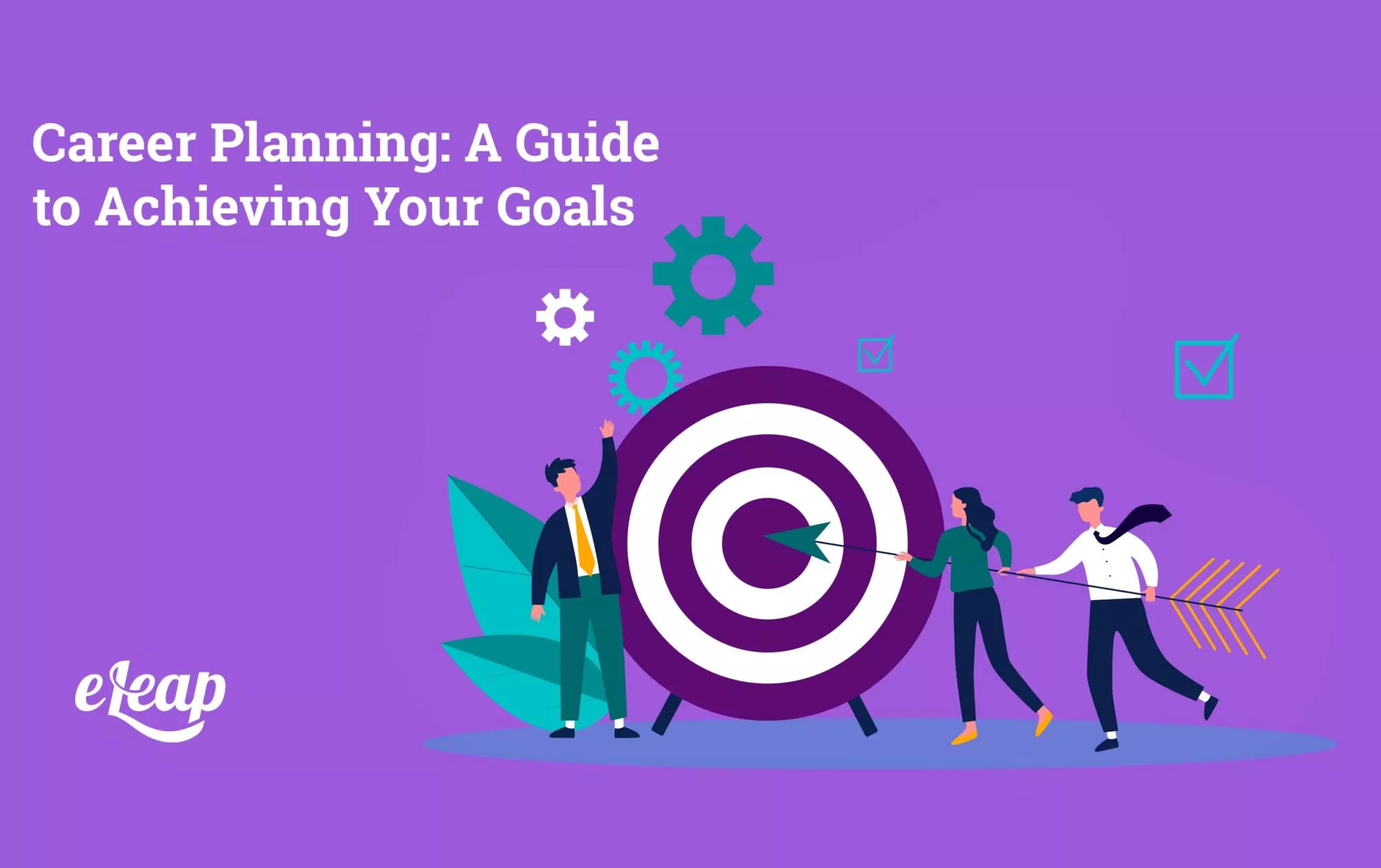Career Planning: A Guide to Achieving Your Goals

Career planning is a strategic approach to managing your career path. It involves setting career goals and developing a roadmap to achieve them. This proactive process helps you align your career aspirations with your skills, interests, and values, ultimately leading to greater job satisfaction and career success. In today’s competitive job market, having a well-thought-out career development plan is crucial for personal and professional growth. See how eLeaP’s Performance Management Platform helps you apply these insights to drive better results.
Setting Your Career Goals
Setting career goals is a fundamental aspect of career planning. It provides direction and a sense of purpose, enabling you to focus your efforts and resources effectively. Career goals fall into two categories: short-term and long-term.
Why Setting Goals is Crucial for Career Success
Setting career goals is essential because it helps you stay motivated and focused. It provides a clear vision of your objectives and the necessary steps. Goals act as a roadmap guiding you through your career journey and helping you measure your progress. Without clear goals, losing direction and becoming complacent in your career is easy.
Types of Career Goals (Short-term vs Long-term)

Short-term career goals are objectives you aim to achieve within a relatively short period, usually within a year or two. These might include learning a new skill, obtaining a certification, or getting promoted. Long-term career goals, on the other hand, are broader and more ambitious, often spanning five to ten years. Examples include reaching a senior management position, starting your business, or becoming an industry expert.
SMART Goals Framework
Using the SMART objectives framework is crucial to ensure the efficacy of your career goals. SMART stands for Specific, Measurable, Achievable, Relevant, and Time-bound. This framework helps you create realistic goals that are easier to track and achieve. For example, instead of setting a vague goal like “advance in my career,” a SMART goal would be “obtain a project management certification within the next six months to qualify for a promotion.”
Steps to Effective Career Planning
Creating an effective career plan involves several key steps, each crucial for developing a comprehensive and actionable roadmap.
Self-Assessment and Reflection
The first step in career planning is self-assessment and reflection. This stage involves evaluating your skills, interests, values, and personality traits to understand which type of career would best fit you. Consider taking career assessment tests or working with a career coach to gain deeper insights into your strengths and areas for improvement. Reflect on your past experiences and achievements to identify patterns and preferences that can guide your career choices.
Research and Exploration
Investigate and consider your alternatives for a career after you have a firm grasp of understanding yourself. Gather information about various industries, job roles, and companies that align with your interests and values. Use online job boards, industry publications, and informational interviews to understand available opportunities. This research phase is crucial for making informed decisions about your career path.
Setting Clear and Achievable Goals
Following extensive research, it is time to develop specific and attainable career goals. Use the insights gained from your self-assessment and inquiry to define specific objectives that align with your long-term career aspirations. Ensure your goals are realistic and feasible based on your current abilities, experience, and resources. Setting clear goals provides a sense of direction and purpose, making it easier to stay focused and motivated.
Developing an Action Plan
With your goals established, the next step is to create a detailed action plan. This plan should outline the steps you need to take to achieve your goals, along with timelines and milestones to track your progress. Break down your goals into smaller, manageable tasks and prioritize them based on their importance and urgency. An action plan helps you stay organized and consistently working towards your objectives.
Continuous Learning and Development
Career planning is not a one-time event but an ongoing process. Continuous learning and development are essential for staying relevant and competitive in your chosen field. Identify opportunities for professional growth, such as attending workshops, pursuing advanced degrees, or obtaining certifications. Keep up with industry developments and advancements to ensure you have the knowledge and abilities needed to succeed. You can adapt to changes and seize new opportunities by committing to lifelong learning.
Tools and Techniques for Career Planning
There are various tools and techniques available to support your career planning efforts. These resources can provide valuable insights and guidance throughout your career journey.
Career Assessment Tools
Career assessment tools, like personality tests, skills assessments, and interest inventories, can help you comprehend your strengths and preferences. These tools provide objective data that guide your career decisions and help you identify suitable career options. Consider reputable assessment tools like the Myers-Briggs Type Indicator (MBTI), the Strong Interest Inventory, or the Clifton Strengths assessment to gain deeper insights into your career potential.
Networking and Mentorship
Networking and mentorship are proven tools for career planning. Building a robust professional network can open doors to new opportunities, provide valuable industry insights, and offer support and guidance. Attend industry events, join professional associations, and connect with colleagues and mentors who can provide advice and mentorship. A mentor can offer personalized guidance, share their experiences, and help you navigate challenges and opportunities in your career.
Professional Development Resources
There are numerous professional development resources available to support your career planning efforts. Online courses, webinars, workshops, and conferences can help you acquire new skills and stay updated with industry trends. Look into platforms like LinkedIn Learning, Coursera, and eLeaP to access high-quality professional development resources. These resources can help you increase your knowledge, qualifications, and appeal in the job market.
Overcoming Challenges in Career Planning
Career planning is not without its challenges. It’s important to be aware of potential obstacles and develop strategies to overcome them.
Common Mistakes to Avoid
One of the most common mistakes in career planning is setting unrealistic or vague goals. It’s important to set specific, achievable, and time-bound goals that provide clear direction. Another mistake is neglecting continuous learning and development. In today’s rapidly changing job market, staying updated with industry trends and acquiring new skills is crucial for career success. Additionally, failing to seek feedback and mentorship can limit your growth and development. Actively seek guidance and feedback from mentors and peers to gain valuable insights and improve your career prospects.
Dealing with Uncertainty and Change
The career landscape is constantly evolving, and dealing with uncertainty and change can be challenging. It’s important to stay adaptable and open to new opportunities. Develop a growth mindset and view challenges as opportunities for learning and growth. Stay proactive in seeking new experiences and expanding your skill set. By embracing change and being flexible, you can navigate uncertainties and seize new opportunities as they arise.
Staying Motivated and Resilient
Maintaining motivation and resilience is crucial for long-term career success. Set regular milestones and celebrate your achievements to stay motivated. Surround yourself with supportive and positive influences who encourage and inspire you. Develop healthy habits and practice self-care to maintain your physical and mental well-being. Remember that setbacks and challenges are a natural part of the career journey. Stay focused on your goals and remain resilient in the face of obstacles.
Real-Life Success Stories
Learning from real-life success stories can provide inspiration and valuable insights for your career planning efforts.
Examples of Successful Career Plans
One example is Jane, a marketing professional who aspires to become a marketing director within five years. She started by identifying the skills and experience needed for the role and then created a detailed action plan. Jane pursued relevant certifications, gained experience in different marketing roles, and sought mentorship from industry leaders. Her dedication and strategic planning paid off, and she achieved her goal within the desired timeframe.
Lessons Learned from Career Journeys
Another example is John, an engineer who faced significant career challenges but turned them into opportunities for growth. After being laid off, John used the opportunity to reassess his career goals and explore new industries. He invested in upskilling and networking, eventually transitioning into a successful career in renewable energy. John’s story highlights the importance of adaptability, continuous learning, and leveraging setbacks as opportunities for growth.
Conclusion
In conclusion, career planning is vital for achieving your professional goals and ensuring long-term career success. You can navigate your job path confidently by setting clear and achievable goals, developing a detailed action plan, and utilizing tools and resources. Remember to stay adaptable, continuously seek learning opportunities, and leverage the support of your network and mentors. With a proactive and strategic approach to career planning, you can achieve your career aspirations and enjoy a fulfilling and successful career journey. Start planning today and take the first step towards achieving your goals with eLeaP Software by your side.